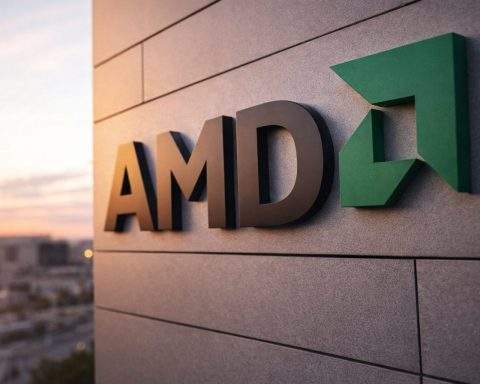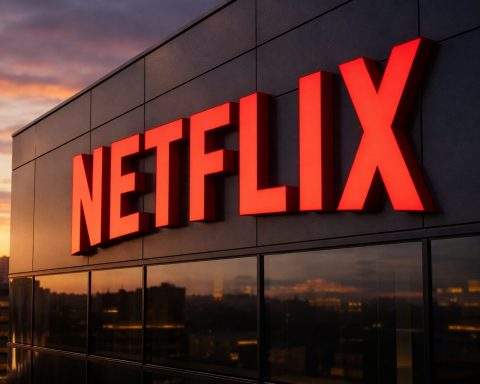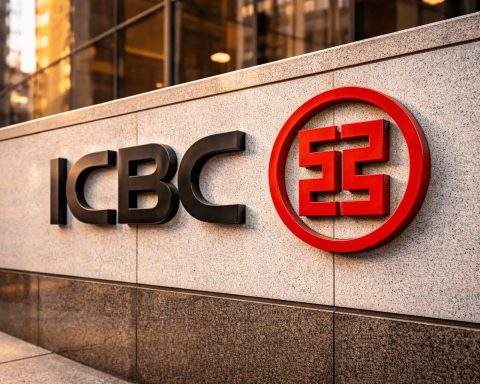- Europe’s STOXX 600 rose 0.3%, the MSCI World index traded within 0.2% of its all-time high, and Wall Street’s S&P 500 and Nasdaq hovered near records.
- Bank of America’s fund-manager survey shows 45% of managers are long Nvidia and Microsoft, making the Magnificent 7 the world’s most crowded trade again.
- Only 5% of investors now expect a hard-landing recession, while a net 14% are overweight equities—the highest since February.
- Corporate bond spreads have narrowed to near 27-year lows as investors price in a rosier outlook, with Fidelity International’s Mike Riddell saying some managers are hedging by staying very defensive in developed-market credit, including zero exposure to cash bonds and a short high-yield.
- July CPI data due, with economists expecting core inflation to rise about 0.3% month over month, lifting the annual core rate to around 3.0%.
- Nvidia and AMD agreed to pay a 15% royalty on their China AI-chip sales to the U.S. government as a condition for export licenses for Nvidia’s H20 chips.
- South Korea’s SK Hynix says AI memory demand will grow about 30% annually through 2030 to tens of billions of dollars, and Seoul said Trump’s proposed 100% tariff on imported semiconductors will not hit firms like SK Hynix and Samsung.
- Oil prices slumped with Brent below $67 and U.S. WTI near $63.30 as supply boosts and geopolitical developments weighed on the outlook.
- China Evergrande is on the verge of delisting from the Hong Kong Stock Exchange after 18 months of suspended trading, with more than $300 billion in liabilities, while Country Garden’s winding-up hearing was postponed to Aug 11 to allow a debt overhaul.
- A senior official said Fannie Mae and Freddie Mac could be IPO’d within this year, marking a milestone in unwinding the post-crisis housing-finance regime.
Finance & Global Markets
Global stock markets edged higher toward record territory as the week began. Europe’s STOXX 600 rose 0.3% and MSCI’s world equity index climbed within 0.2% of its all-time high reuters.com. Wall Street’s S&P 500 and Nasdaq are hovering near record levels, buoyed by a strong U.S. earnings season and improving sentiment in Europe reuters.com reuters.com. A Bank of America fund manager survey showed investors piling back into big U.S. tech stocks – the “Magnificent 7” – which was named the world’s most crowded trade again as 45% of polled managers went long on giants like Nvidia and Microsoft reuters.com reuters.com. Broad sentiment is improving, with only 5% of investors now bracing for a “hard landing” recession reuters.com and a net 14% overweight equities – the highest since February 1 .
However, credit markets flashed caution despite the equity optimism. Corporate bond spreads have narrowed to near 27-year lows, pricing in a far rosier outlook than many economists forecast reuters.com. Some major asset managers are hedging against a potential downturn: “We’ve turned very defensive in developed market credit… We have zero exposure in cash bonds and are short high-yield,” said Mike Riddell of Fidelity International reuters.com. Analysts note rising demand for credit default protection, warning that if credit markets crack, equity markets could follow within months reuters.com reuters.com. As one strategist remarked, “When credit markets come under pressure eventually equity markets come under pressure as well” reuters.com, underscoring the jittery undercurrent beneath the stock rally.
In currencies and bonds, traders looked ahead to a crucial U.S. inflation report due Tuesday. The dollar and Treasury yields held steady as July CPI data will help refine odds of any Fed rate cuts reuters.com. Economists expect core inflation rose ~0.3%, potentially lifting the annual core rate to ~3.0% reuters.com. A softer CPI could bolster hopes for Fed easing and extend the stock rally, while a hotter reading may “spark stagflation fears” and test the market’s resilience 2 .
Technology Sector
Tech industry headlines were dominated by geopolitics and artificial intelligence. In a surprising weekend deal, U.S. chipmakers Nvidia and AMD agreed to pay a 15% royalty of their China sales on advanced AI chips to the U.S. government reuters.com. This unprecedented arrangement was a condition for Washington granting export licenses for Nvidia’s H20 AI chips, which had been halted on national security grounds reuters.com reuters.com. Experts expressed bewilderment at the move. “It’s wild – either selling these AI chips to China is a national security risk, or it’s not. Why are we putting an extra penalty on the sale?” questioned Geoff Gertz of the Center for New American Security reuters.com. A former Commerce Department adviser criticized that if true, the administration is effectively “trading away national security protections for revenue” reuters.com. Nvidia said only that it follows U.S. government rules, and hopes export controls will still let America compete in the China market reuters.com reuters.com. (Notably, the Financial Times first reported this deal on Sunday, prompting U.S. officials to confirm the story reuters.com 3 .)
Leading chipmakers remain bullish on AI demand despite trade tensions. South Korea’s SK Hynix told Reuters it expects the specialized memory market for AI to grow 30% annually through 2030, reaching “tens of billions” of dollars reuters.com reuters.com. The company is ramping up production of high-bandwidth memory (HBM) chips critical for generative AI, brushing off concerns of rising costs. SK Hynix also got a relief on the policy front: a Seoul trade envoy said that Trump’s proposed 100% tariff on imported semiconductors will not hit Korean firms like SK Hynix and Samsung reuters.com – likely because of their U.S. plants and allied status. (President Trump had announced plans last week for steep chip tariffs to pressure trade partners reuters.com, but South Korea’s quick diplomacy suggests some exemptions are in play 4 .)
The Big Tech elite continued to draw investor favor. Bank of America’s August survey found that being long the U.S. tech megacaps – dubbed the “Magnificent 7” (Apple, Microsoft, Alphabet, Amazon, Nvidia, Tesla, and Meta) – is once again seen as the world’s most crowded trade reuters.com. Strong Q2 earnings helped these stocks rebound from an April slump tied to tariff fears reuters.com. Fund managers also reported improved outlooks on the global economy, with fewer expecting a sharp slowdown reuters.com. Still, tech faces new headwinds from trade disputes. India, for instance, has become a battleground after Trump imposed sweeping tariffs (50%) on Indian goods. Prime Minister Modi’s supporters responded with calls to boycott U.S. tech and consumer brands – from Apple and Amazon to Coca-Cola – stoking nationalist sentiment reuters.com reuters.com. “People are now looking at Indian products… This is a call for nationalism, patriotism,” said Ashwani Mahajan, co-convenor of a swadeshi (self-sufficiency) group pressing Indians to shun foreign goods reuters.com reuters.com. While U.S. firms haven’t yet reported sales hits in India, the anti-American buzz on social media is notable, with even some urging India to build its own alternatives to Twitter, Google and WhatsApp reuters.com 5 .
Energy & Commodities
Oil prices slumped to their lowest levels in months amid a confluence of supply boosts and geopolitical developments. Brent crude fell below $67 per barrel on Monday, extending last week’s 4% slide wtvbam.com wtvbam.com. An OPEC+ output hike in September has added to oversupply worries, just as new U.S. tariffs darken the demand outlook wtvbam.com. President Trump’s trade offensive – raising import tariffs on dozens of countries effective last Thursday – is expected to weaken global growth and fuel inflation, a combination that drags on oil consumption wtvbam.com wtvbam.com. Additionally, expectations of progress in the Ukraine war negotiations are weighing on crude. Trump announced he will meet Russia’s President Vladimir Putin on Aug. 15 in Alaska to discuss ending the conflict, and he warned that if no peace deal was reached by last week, buyers of Russian oil could face secondary sanctions wtvbam.com wtvbam.com. Now that talks are planned, markets anticipate a possible easing of war-related oil sanctions, which would unleash more supply. Traders also noted that India is under U.S. pressure to curtail imports of cheap Russian crude wtvbam.com. With supply pressures mounting, Brent settled around $66.07 and U.S. WTI near $63.30 on Monday wtvbam.com – prices not seen in over a year, and a far cry from the $80s per barrel earlier this summer.
In metals, confusion over U.S. tariffs briefly roiled the gold market. Last week, a U.S. Customs ruling implied that the most-traded Swiss gold bullion bars would no longer be exempt from Trump’s country-specific import tariffs, potentially slapping a 39% duty on gold imports reuters.com reuters.com. The news sent COMEX gold futures soaring and prompted at least one major Swiss refinery to halt gold shipments to the U.S. reuters.com reuters.com. The White House hastened to clarify that this was “misinformation”. Officials said a new executive order is coming to exempt gold bars and “clear things up”, suggesting the tariff scare was unintended reuters.com reuters.com. Gold prices pared back gains after the White House assured markets no new bullion tariffs would actually hit reuters.com reuters.com. Still, the episode highlighted the chaotic impact of rapidly changing trade policies on commodity flows. A Swiss industry group lamented that even the prospect of 39% tariffs was “a blow for the industry and for Switzerland,” and analysts warned it would “pour sand in the engine” of a well-oiled global gold market reuters.com 6 .
Trade & Policy Developments
Trade tensions dominated global business discourse over the weekend, as President Trump’s tariff salvos drew responses at home and abroad. A key deadline in the U.S.–China trade truce arrives August 12, when a temporary tariff ceasefire was set to expire. Both Washington and Beijing have dropped hints that the deadline will be extended to avoid escalation reuters.com. Indeed, markets seem to expect a continued truce – U.S. equity futures and Chinese stocks have been relatively calm, and tariff negotiations with allies are ongoing. Taiwan’s government said it is “continuing tariff negotiations” with the U.S. to mitigate the impact of Trump’s new duties reuters.com. Japan dispatched a trade team to Washington last week after some of its exports were accidentally double-taxed under the fast-moving U.S. tariff regime reuters.com reuters.com, an issue Tokyo believes is now resolved in principle. As one Reuters columnist quipped, the recent chaos shows “chaos is a feature, not a bug” in the current trade policy approach 7 .
Trump also turned up the pressure on China’s agricultural purchases. In a Truth Social post late Sunday, he urged China to “quickly quadruple” imports of U.S. soybeans, claiming Beijing fears a supply shortfall reuters.com. The plea comes as Trump considers extending the tariff truce; some observers suspect he’s using big farm deals as a bargaining chip for a longer peace. U.S. soybean futures jumped over 2% on Monday to around $10.11/bushel after Trump’s remarks reuters.com. But analysts were skeptical China could ever meet that ask. “It’s highly unlikely China would ever buy four times its usual volume of U.S. soybeans,” said Johnny Xiang of AgRadar Consulting in Beijing reuters.com reuters.com. Quadrupling would mean China shifts virtually all its soybean imports (over 100 million tons a year) to U.S. suppliers, ditching Brazil. In reality, Chinese feed companies have been reducing reliance on U.S. beans – even testing Argentine soy meal – amid the tensions reuters.com. Chinese soymeal prices actually dipped on the news, reflecting expectations of a flood of U.S. supply if any deal materializes reuters.com. A Chinese ag analyst noted Beijing has signaled it “is prepared to forego U.S. soybeans altogether this year” if needed reuters.com. The tariff politics behind the scenes: Trump hinted he may extend the truce beyond Aug 12, implying China boosting farm purchases could be one precondition reuters.com 8 .
Major U.S. trading partners are grappling with the fallout of Trump’s tariff blitz unveiled last week. India was hit particularly hard by new American duties. Trump imposed an additional 25% tariff on Indian goods (punishing New Delhi for buying Russian oil), raising total U.S. tariffs on India to a hefty 50% reuters.com. On Monday, India’s government revealed that about 55% of its exports to the U.S. now face Trump’s tariffs, threatening billions in trade reuters.com. The duty hike – one of the steepest ever on a major U.S. trading partner – “rattled exporters” and is straining U.S.-India relations reuters.com. Prime Minister Modi’s administration is scrambling for feedback from affected industries and engaging in talks to mitigate the impact reuters.com. The frictions have spilled into public sentiment: nationalist groups in India staged small protests urging consumers to “buy local” and boycott American brands reuters.com reuters.com. While U.S. firms remain committed to India’s huge market, the tit-for-tat could slow investment. Indian officials, meanwhile, emphasize that dialogue is ongoing and hope to avoid a full-blown trade war.
On the geopolitical front, U.S.–Russia relations are at a pivotal moment with business implications. Trump’s planned meeting with Putin in Alaska on Aug. 15 to discuss a Ukraine peace deal has raised the prospect of sanctions relief if a breakthrough is reached wtvbam.com. European natural gas and grain markets are watching closely, since an end to the war could reopen Black Sea trade routes and energy flows. Conversely, failure could mean harsher sanctions: Trump had warned Russia’s oil customers of secondary sanctions if Moscow didn’t move toward peace wtvbam.com. The energy market reacted already – oil traders see a higher chance of Russian crude returning to market, contributing to this week’s price drop wtvbam.com. Gold and other commodities sensitive to sanctions likewise experienced volatility on mixed signals from Washington (as seen with gold tariffs confusion above). The coming days will be critical for businesses as they navigate these high-stakes diplomatic efforts.
Real Estate & Infrastructure
The global real estate sector presented a mixed picture. In China, the property crisis grinds on with no end in sight. Heavily indebted developer China Evergrande – once China’s largest – is now on the verge of delisting from the Hong Kong Stock Exchange after 18 months of suspended trading reuters.com reuters.com. Evergrande failed to finalize a debt restructuring plan for its $300+ billion liabilities and was pushed into liquidation proceedings, casting a shadow over China’s whole realty market reuters.com reuters.com. The downturn has proven deeper and more prolonged than officials expected. New home prices in China are still falling (down at the fastest pace in 8 months as of June) and even developers that restructured debts are already struggling again reuters.com reuters.com. More than 70% of Chinese developers’ offshore bonds have defaulted since 2021 reuters.com. “There’s no light at the end of the tunnel,” warned Glen Ho, a restructuring leader at Deloitte, referring to the ongoing property slump reuters.com. His assessment highlights that many firms are seeking to delay debt repayments, but demand and cashflow remain too weak to support the sector reuters.com reuters.com. Another major developer, Country Garden, had a winding-up hearing scheduled for Aug 11 in Hong Kong, but creditors agreed to postpone formal liquidation to allow more time for a debt overhaul reuters.com. Still, without a dramatic market recovery or government rescue, analysts say China’s real estate woes will continue weighing on its broader economy and banking system.
Elsewhere in Asia, a high-profile real estate development controversy made headlines in Vietnam. An exclusive Reuters report revealed that Vietnamese farmers are being displaced on difficult terms to make way for a new $1.5 billion Trump-branded golf resort outside Hanoi article.wn.com. One farmer was offered compensation of just $3,200 plus some rice for her land – a sum she deemed far too low, leading her to sleepless nights worrying about her family’s future article.wn.com. The project, backed by the Trump Organization and local partners, promises a luxury golf and leisure complex. Local authorities insist they followed law in acquiring land, but the story underscores the social tensions such mega-projects can generate. The Trump resort broke ground recently amid some protests; farmers complain they weren’t given fair market value and that their way of life is being upended for a wealthy enclave. It casts light on the broader issue of land rights in emerging markets – and shows the Trump business brand’s expansion into Asia is not without controversy. (Trump’s company has not commented on the specifics of the compensation, but observers note these conflicts could pose reputational risks.)
In the Western real estate markets, rising interest rates have cooled activity, but there was one notable M&A play linked to property this period: U.S. money transfer giant Western Union announced a $500 million acquisition of Intermex, a cross-border payments firm focusing on Latin America reuters.com. While not a real estate deal per se, Western Union’s move underscores a strategic push into high-growth markets (like LatAm) and could indirectly benefit property transactions by smoothing remittances and payments. The deal, unveiled Sunday, came at a hefty 70% premium for Intermex shareholders reuters.com. Western Union expects the purchase to boost its earnings and expand its reach in “historically high-growth” Latin American corridors reuters.com reuters.com. Robust M&A like this signals confidence that certain emerging economies (with large diaspora remittances fueling housing and consumer spending) will remain resilient.
Finally, housing finance drew attention in the U.S.: a senior official suggested the Trump administration is eyeing initial public offerings (IPOs) for mortgage giants Fannie Mae and Freddie Mac within this year reuters.com. These government-backed entities have been under conservatorship since 2008, and floating them on the stock market would mark a major milestone in unwinding the post-crisis housing market regime. Markets will be watching closely, as any steps toward Fannie/Freddie IPOs could impact mortgage rates, housing credit, and real estate activity. That news, along with a slight dip in U.S. mortgage rates reported in early August, indicates a possible thaw in America’s housing freeze. Real estate professionals note that if financing costs ease, pent-up buyer demand could return – but much depends on the Fed and economic trajectory as 2025 progresses.
Sources: Reuters, et al. – reuters.com reuters.com reuters.com reuters.com reuters.com reuters.com reuters.com reuters.com reuters.com reuters.com reuters.com reuters.com reuters.com reuters.com wtvbam.com wtvbam.com reuters.com reuters.com reuters.com reuters.com reuters.com reuters.com reuters.com reuters.com reuters.com reuters.com 9






